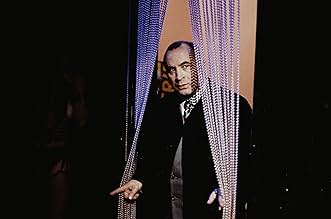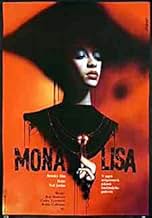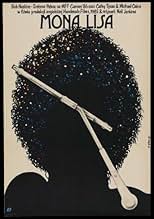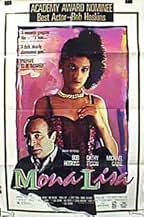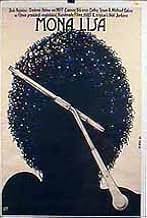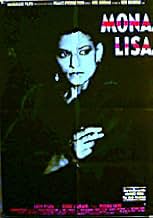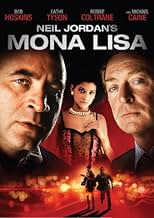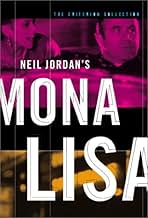Mona Lisa
- 1986
- Tous publics
- 1h 44min
NOTE IMDb
7,3/10
20 k
MA NOTE
Un homme récemment libéré de prison parvient à trouver un emploi en conduisant une call-girl de client en client.Un homme récemment libéré de prison parvient à trouver un emploi en conduisant une call-girl de client en client.Un homme récemment libéré de prison parvient à trouver un emploi en conduisant une call-girl de client en client.
- Réalisation
- Scénario
- Casting principal
- Nommé pour 1 Oscar
- 14 victoires et 14 nominations au total
Joseph Karimbeik
- Raschid
- (as Hossein Karimbeik)
John R. Darling
- Hotel Security
- (as John Darling)
Raad Rawi
- Arab Servant
- (as Raad Raawi)
Avis à la une
George (Bob Hoskins) gets out of prison but his wife won't let him see his daughter. Thomas (Robbie Coltrane) is his friend from the old days. Times have changed. The only job he can get is to drive high-priced call girl Simone (Cathy Tyson) for local gangster Denny Mortwell (Michael Caine). George and Simone don't get along at first. Simone talks George into looking for young prostitute Cathy but he befriends abused May (Sammi Davis) instead. Meanwhile Denny wants George to find out what Simone is doing with one particular client.
Cathy Tyson is electric in her character. Bob Hoskins is great but his character is conveniently written dumb sometimes. At times, he's too naive like crashing in on one of Simone's tricks. I don't know what exactly he expects to see in that room. Sammi Davis is absolutely heart-breaking. The movie is a little uneven at times but the two leads are great.
Cathy Tyson is electric in her character. Bob Hoskins is great but his character is conveniently written dumb sometimes. At times, he's too naive like crashing in on one of Simone's tricks. I don't know what exactly he expects to see in that room. Sammi Davis is absolutely heart-breaking. The movie is a little uneven at times but the two leads are great.
Mona Lisa is a classic 80s low budget thriller that combines raw power with an emotional storyline resulting in an acting masterclass from a virtually faultless cast. Bob Hoskins is mesmerising from the very opening seconds of the film, playing lonely naive chancer George. He has just been released from prison after 7 years for taking the rap for a crime committed by local gangland boss Denny Mortwell (Michael Caine). Caine soon gets George back on the payroll, as an exclusive chauffeur for high class call girl Simone (Cathy Tyson). But George helplessly falls for Simone and gets sucked into her secret agenda for trawling London's seedy underworld - mainly prostitution. The film is a masterpiece from director Neil Jordan - easily his best work to date and has never been bettered - and the cast benefit greatly from an impeccable script. Jordan's ear for dialogue is never more evident than here - especially in Geroge's conversations with his only true friend Thomas (Robbie Coltrane). Anyone who thought Hoskins couldn't better his performance in The Long Good Friday in 1979 should take a look at this. He is simply astonishing and your eyes never leave a single scene he is in. But no review would be complete without paying tribute equally to the unearthed gem that is Cathy Tyson. Bearing in mind she was barely 20 when this movie was shot, she is incredible opposite Hoskins and whilst she has had more of a TV career since, it is surprising (and perhaps a shame) that she has never had perhaps the vehicle or opportunity to scale such heights again. However, Kate Hardie is also deserving of special mention as a fellow hooker, and her great portrayal in this movie has shamefully been totally overlooked over the years. Caine's cameo appearance is also menacingly good, and he plays the seedy villain with chilling ease. Throw in the great location work around London's Soho and Brighton, and a great tune from Genesis, and you get a presentation every bit as high class as Tyson's Simone is meant to be.
Neil Jordan's 'Mona Lisa' is a great film that was sadly forgotten over time, even though Hoskins got an Oscar nomination for the film. 'Mona Lisa' follows a basically good guy whose made some bad choices George (Bob Hoskins) and his return from prison. Shunned from his wife and some of his old buddies, George feels kind of unwanted but gets a job from his old boss (Michael Caine) chauffeuring a call girl (Cathy Tyson) around at night. The call girl and George form a bond, while the story turns into violence, crime and George and the call girl's search for a young innocent teenage girl forced into prostitution. In my opinion, 'Mona Lisa' is one of Jordan's best films if not his best. Hoskins is absolutely amazing in his role, while Cathy Tyson and Michael Caine provide solid performances as well. Clarke Peters (who you may know as Detective Freeman from HBO's brilliant dramatic series 'The Wire') is also in this as Cathy Tyson's evil and psychotic pimp. For all you indie fans out there, rush to the Blockbuster near you to rent 'Mona Lisa' (make sure it's not 'Mona Lisa Smile', that movie is a tad bit different.) Most likely, you'll find a lot to enjoy and/or admire about this little British indie gem. Grade: B+
Bob Hoskins made two widely popular movies in the 1980s and this was one of them. Having seen the other, "The Long Good Friday," I wasn't expecting too much but was pleasantly surprised. Hoskins, just out of the slams, is hired to drive a high-end black hooker, Cathy Tyson, from one wealthy client to another. He grows to care for her and when she asks him for a favor, find a strung-out young girl named Kathy, a former roomie of hers, he agrees. He searches the seedier places of London until he finally digs her up. She very young and very hooked. Robbie Coltrane is Hoskins' friend, and Michael Caine is a sort of procurer. The ending is both distressing and violent -- distressing because some of these characters are fully fleshed and we feel we've come to know them.
The film is quite nicely done. The score makes much use of Nat "King" Cole's ballad, Mona Lisa, evoking mystery, and it's appropriate. The composer has worked what seem to be endless variations of the first four notes of the theme into the score. We hear it in the background often, in minor key, or played exclusively on double bass, or burnished by horns. Those four notes insinuate themselves into the incidental music so often that a listener loses the sense that they are the introduction to a pop song and they come to have an ominous functional autonomy, disembodied from the simple tune that prompted it. They become their own song.
The acting is fine. Bob Hoskins is an essentially moral guy, short and unprepossesing, who first shows up on screen wearing an echt-1970s bell-bottomed leisure suit (he's been in for seven years, remember) and carrying a bouqet of flowers that his wife, berserk with anger, tells him what to do with. His gradual attraction to his passenger is nicely laid out, as are the reasons for his occasional displays of violence. He's a sensitive guy, but not too thoughtful. A lot of things get by him. But, to be fair, they get by the viewer too.
There's an element of humor running through the film, mostly expressed in the relationship between Hoskins and Coltrane, who plays a writer and a sculptor of things made of plastic spaghetti. ("The Japanese have cornered the market.") The dialogue is pretty funny in a low-key way. Hoskins and Coltrane sit watching TV and Hoskins remarks something like, "Remember that guy who was murdered? Well, I did it." Coltrane: "You're not joking?" Hoskins (turning and staring grimly): "I -- never -- joke." Coltrane: "You used to tell that one about the randy gorilla." And here is Hoskins describing his passenger, telling Coltrane that she's not out to exploit him, Hoskins, because "she's a lady." Coltrane: "A lady? I thought you said she was a tart." Hoskins: "Well -- she is, but she's a f****** lady too."
And Cathy Tyson almost beggars description, tall, slender, lithe, not staggeringly beautiful or sexy, but her appeal extends far beyond mere appearance. She's gorgeous in the most personal way. She tends to keep her face down and her eyes lowered, almost demurely, and her voice is soft and low, just above a whisper, although you never have to strain to hear what she's saying because her pronunciation is modulated and precise. It's soothing, in control and at the same time reassuring, the voice of an announcer on a late-night FM station playing nothing but classical music. You could listen to her for hours. You could look at her for hours too, for that matter. Michael Caine doesn't have a big or showy part, but he's so reliable that he's always a pleasure to see on screen. I can't think of a single film that has been damaged by his presence, although he's been in a few bummers.
The photography is perceptive. We get a good deal of local color not only from the London locations but from "the seaside," where everything comes to a head. There isn't a lot of violence. What there is of it is quick and pointed.
See it if you get the chance.
The film is quite nicely done. The score makes much use of Nat "King" Cole's ballad, Mona Lisa, evoking mystery, and it's appropriate. The composer has worked what seem to be endless variations of the first four notes of the theme into the score. We hear it in the background often, in minor key, or played exclusively on double bass, or burnished by horns. Those four notes insinuate themselves into the incidental music so often that a listener loses the sense that they are the introduction to a pop song and they come to have an ominous functional autonomy, disembodied from the simple tune that prompted it. They become their own song.
The acting is fine. Bob Hoskins is an essentially moral guy, short and unprepossesing, who first shows up on screen wearing an echt-1970s bell-bottomed leisure suit (he's been in for seven years, remember) and carrying a bouqet of flowers that his wife, berserk with anger, tells him what to do with. His gradual attraction to his passenger is nicely laid out, as are the reasons for his occasional displays of violence. He's a sensitive guy, but not too thoughtful. A lot of things get by him. But, to be fair, they get by the viewer too.
There's an element of humor running through the film, mostly expressed in the relationship between Hoskins and Coltrane, who plays a writer and a sculptor of things made of plastic spaghetti. ("The Japanese have cornered the market.") The dialogue is pretty funny in a low-key way. Hoskins and Coltrane sit watching TV and Hoskins remarks something like, "Remember that guy who was murdered? Well, I did it." Coltrane: "You're not joking?" Hoskins (turning and staring grimly): "I -- never -- joke." Coltrane: "You used to tell that one about the randy gorilla." And here is Hoskins describing his passenger, telling Coltrane that she's not out to exploit him, Hoskins, because "she's a lady." Coltrane: "A lady? I thought you said she was a tart." Hoskins: "Well -- she is, but she's a f****** lady too."
And Cathy Tyson almost beggars description, tall, slender, lithe, not staggeringly beautiful or sexy, but her appeal extends far beyond mere appearance. She's gorgeous in the most personal way. She tends to keep her face down and her eyes lowered, almost demurely, and her voice is soft and low, just above a whisper, although you never have to strain to hear what she's saying because her pronunciation is modulated and precise. It's soothing, in control and at the same time reassuring, the voice of an announcer on a late-night FM station playing nothing but classical music. You could listen to her for hours. You could look at her for hours too, for that matter. Michael Caine doesn't have a big or showy part, but he's so reliable that he's always a pleasure to see on screen. I can't think of a single film that has been damaged by his presence, although he's been in a few bummers.
The photography is perceptive. We get a good deal of local color not only from the London locations but from "the seaside," where everything comes to a head. There isn't a lot of violence. What there is of it is quick and pointed.
See it if you get the chance.
"Mona Lisa" is one of those weird Neil Jordan dramedies which resound with more ferocity upon afterthought than while actually watching it. Like "The Crying Game", I was left with no immediate impression of the movie, but days after watching it, I became haunted by the film's ingratiating reality. You can tell you're watching a good movie when you can describe it as "atmospheric" without the film trying overtly to reach for that effect.
Bob Hoskins stars as George, and as we first see him, he is lulling along a dismal London apartment neighborhood with a plastic bag and a fistful of flowers. As he reaches his destination, the audience soon realizes what a heartbroken journey this man's life has been. Indeed his good intentions at seeing his wife and daughter are mired by the wife's stubborn, yet understandable reaction of slamming the door in her ex-convict husband's face.
Soon George is hired by the callous gangster Mortwell (Michael Caine) as a chauffeur for the high-class call girl Simone (Cathy Tyson). He is at first repelled by the "tall black tart", as she remarks about his slovenly appearance. In a subplot structured like a revisionist feminine "Pygmalion", George is made over by the prostitute into the appearance of a "gentleman", a contempestuous appearance which only magnifies his good-hearted nature in comparison with the cold-blooded Mortwell.
Soon, however, George and Simone strike a bond seemingly based on a mutual affection for the souls lurking beneath each facade. Simone details to George an old blonde friend named Cathy still working the streets and implores him to rescue her. Jordan builds upon the elements of "Taxi Driver" here and even pays homage to that film in one scene depicting the front end of George's automobile backlit by a seedy district filled with peep shows and pedophiles.
Of course George is starting to fall for his elegant charge, but his feelings are more of a fatherly nature than anything. Simone seems to feed off this affection, as she states that she does no more than drink tea at the behest of her clients and even provides snapshots of her doing so. This is why it comes as even more of a shock to George when he accidentally discovers a porn video featuring Simone at the provocation of things which her innocent demeanor had previously rendered him incapable of imagining.
Much of "Mona Lisa" is built around human desperation, and indeed one can sense that George, like Travis Bickle or Jimmy Stewart in "Vertigo", is attempting to erroneously place the puzzled-together image of the perfect woman into the jagged emotional contours of his love interest. Of course the title implies this, and Jordan reinforces this symbolization with not only the Da Vinci painting and the Nat "King" Cole ballad, but with the incandescent statues of the Virgin Mary which his friend (Robbie Coltrane) collects. This is unarguably Hoskins' best performance, in a career entirely overlooked by even the most driven of film fanatics. After roles in "The Long Good Friday", "Pink Floyd: The Wall", this, "Who Framed Roger Rabbit", and the upcoming "Felicia's Journey", one can deduce the sheer emotional vicissitude which compelled him to aim for, let alone attain, the raw power that comprises his characters.
Bob Hoskins stars as George, and as we first see him, he is lulling along a dismal London apartment neighborhood with a plastic bag and a fistful of flowers. As he reaches his destination, the audience soon realizes what a heartbroken journey this man's life has been. Indeed his good intentions at seeing his wife and daughter are mired by the wife's stubborn, yet understandable reaction of slamming the door in her ex-convict husband's face.
Soon George is hired by the callous gangster Mortwell (Michael Caine) as a chauffeur for the high-class call girl Simone (Cathy Tyson). He is at first repelled by the "tall black tart", as she remarks about his slovenly appearance. In a subplot structured like a revisionist feminine "Pygmalion", George is made over by the prostitute into the appearance of a "gentleman", a contempestuous appearance which only magnifies his good-hearted nature in comparison with the cold-blooded Mortwell.
Soon, however, George and Simone strike a bond seemingly based on a mutual affection for the souls lurking beneath each facade. Simone details to George an old blonde friend named Cathy still working the streets and implores him to rescue her. Jordan builds upon the elements of "Taxi Driver" here and even pays homage to that film in one scene depicting the front end of George's automobile backlit by a seedy district filled with peep shows and pedophiles.
Of course George is starting to fall for his elegant charge, but his feelings are more of a fatherly nature than anything. Simone seems to feed off this affection, as she states that she does no more than drink tea at the behest of her clients and even provides snapshots of her doing so. This is why it comes as even more of a shock to George when he accidentally discovers a porn video featuring Simone at the provocation of things which her innocent demeanor had previously rendered him incapable of imagining.
Much of "Mona Lisa" is built around human desperation, and indeed one can sense that George, like Travis Bickle or Jimmy Stewart in "Vertigo", is attempting to erroneously place the puzzled-together image of the perfect woman into the jagged emotional contours of his love interest. Of course the title implies this, and Jordan reinforces this symbolization with not only the Da Vinci painting and the Nat "King" Cole ballad, but with the incandescent statues of the Virgin Mary which his friend (Robbie Coltrane) collects. This is unarguably Hoskins' best performance, in a career entirely overlooked by even the most driven of film fanatics. After roles in "The Long Good Friday", "Pink Floyd: The Wall", this, "Who Framed Roger Rabbit", and the upcoming "Felicia's Journey", one can deduce the sheer emotional vicissitude which compelled him to aim for, let alone attain, the raw power that comprises his characters.
Le saviez-vous
- AnecdotesMortwell's strip club is actually the famous Raymond RevueBar in London's Soho district. The giant prop hand Mortwell sits in was a famous element of the show, visible in a lot of promotional material for the club. At one point George walks past a poster for the Festival of Erotica, a real show at the RevueBar at the time.
- GaffesA camera shadow is visible on the racks of clothes when Simone and George go shopping.
- Crédits fousIn the credits at the end, "Richard Starkey, MBE" (i.e., Ringo Starr) is listed as "Special Production Assistant."
- ConnexionsFeatured in At the Movies: Desert Hearts/Mona Lisa/Letter to Brezhnev (1986)
- Bandes originalesMona Lisa
by Jay Livingston and Ray Evans
Used by permission of Famous Music Corporation
Performed by Nat 'King' Cole
Original Sound Recording Owned and Controlled by Capitol Records, Inc.
Meilleurs choix
Connectez-vous pour évaluer et suivre la liste de favoris afin de recevoir des recommandations personnalisées
- How long is Mona Lisa?Alimenté par Alexa
Détails
- Date de sortie
- Pays d’origine
- Site officiel
- Langue
- Aussi connu sous le nom de
- 蒙娜麗莎
- Lieux de tournage
- Crystal Palace Road, East Dulwich, London, Greater London, Angleterre, Royaume-Uni(where George is confronted by his daughter and wife)
- Sociétés de production
- Voir plus de crédits d'entreprise sur IMDbPro
Box-office
- Montant brut aux États-Unis et au Canada
- 5 794 184 $US
- Week-end de sortie aux États-Unis et au Canada
- 99 361 $US
- 15 juin 1986
- Montant brut mondial
- 5 794 184 $US
Contribuer à cette page
Suggérer une modification ou ajouter du contenu manquant





